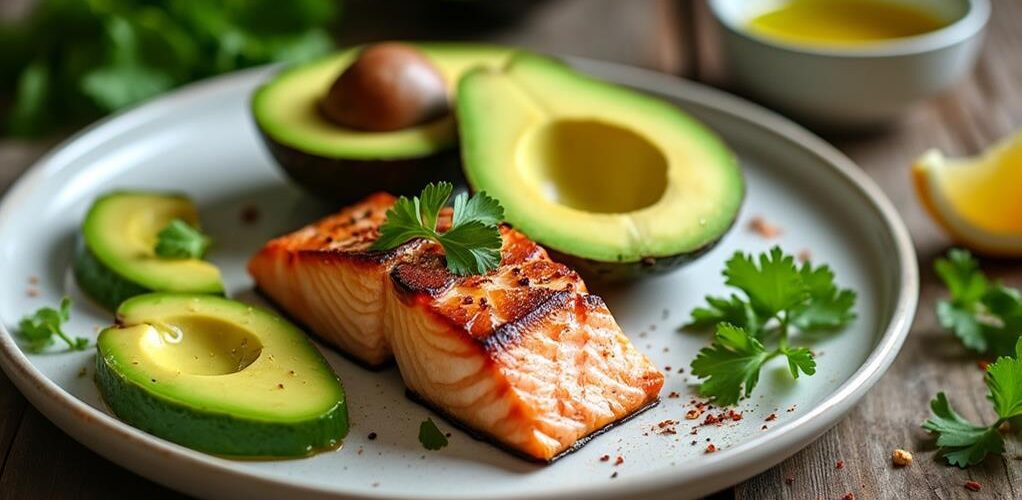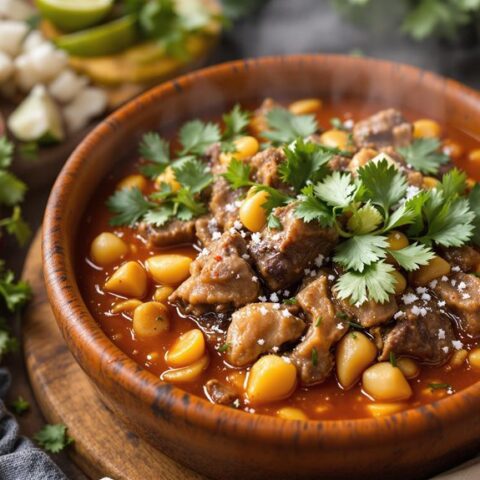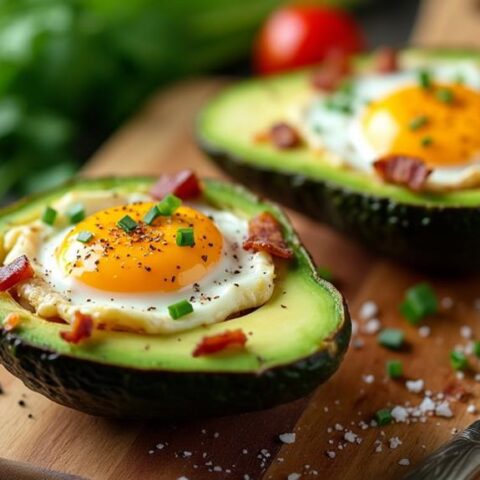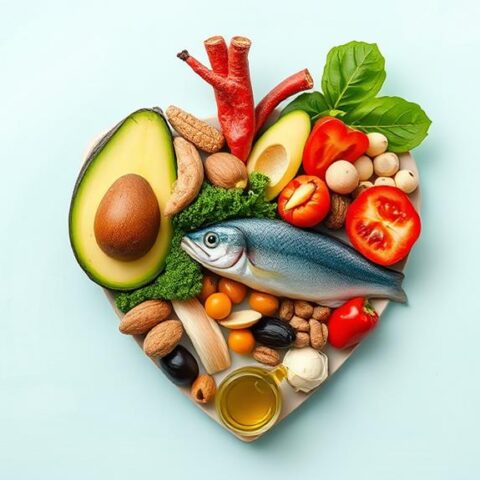
Adopting a ketogenic diet is simplified by focusing on three essential food categories: fish and seafood, low-carb vegetables, and healthy fats and oils. Fish like salmon provide essential omega-3 fatty acids and protein with minimal carbs, supporting heart health and inflammation reduction. Low-carb vegetables such as broccoli and spinach are rich in vitamins and fiber, enhancing nutrient density while maintaining ketosis. Healthy fats, including olive oil and avocados, offer monounsaturated fats and fiber, vital for sustained energy and metabolic health. Explore these categories to guarantee nutritional adequacy and optimize your ketogenic journey further.
Key Takeaways
- Fish and seafood provide high-quality protein and essential fatty acids, ideal for ketosis.
- Low-carb vegetables like broccoli and spinach are nutrient-dense and low in carbs.
- Healthy fats and oils, such as olive oil and coconut oil, support heart health and ketosis.
- Avocados offer monounsaturated fats, fiber, and essential vitamins for nutrient density.
- Nuts and seeds, like walnuts and chia seeds, supply omega-3 fatty acids and fiber.
Fish and Seafood
Fish and Seafood
Incorporating fish and seafood into a keto diet offers numerous nutritional advantages, underscored by their high-quality protein content and essential fatty acids. Fatty fish like salmon are an excellent source of omega-3 fatty acids, which support heart health and reduce inflammation.
Shrimp and most crabs contain zero carbs, making them perfect for maintaining ketosis. To maximize these benefits, it is recommended to consume at least two 3-ounce servings of fatty fish weekly. This intake has been associated with improved hemoglobin A1c levels and a decreased risk of chronic diseases.
Low-carb options such as shrimp (0g carbs) and clams (4.4g carbs) are particularly beneficial for maintaining ketosis. These seafood options not only contribute to the protein requirements vital for muscle maintenance and repair but also remain low in carbohydrates, making them ideal for a keto diet.
Additionally, fish is rich in B vitamins, essential for energy production and proper metabolic function.
To guarantee an environmentally responsible approach, sustainable fishing practices should be prioritized. Integrating a variety of seafood recipes can enhance nutrient diversity, providing essential vitamins and minerals.
This strategy supports both nutritional goals and environmental sustainability, making seafood a cornerstone of a balanced keto diet.
Low-Carb Vegetables
While fish and seafood provide a robust foundation for a ketogenic diet through their high-quality proteins and omega-3 fatty acids, the inclusion of low-carb vegetables is equally significant for achieving a well-rounded nutritional profile.
Low-carb vegetables, such as broccoli, spinach, and zucchini, typically contain less than 8 grams of net carbs per cup, making them ideal for maintaining ketosis. These vegetables are rich in essential vitamins, particularly vitamin C and antioxidants, while being low in calories, thereby enhancing the nutrient density of a keto meal plan.
Incorporating leafy greens like kale and Swiss chard can further bolster fiber intake, supporting digestion and promoting metabolic health. The diverse textures and flavors offered by non-starchy vegetables make them versatile options for various dishes, including salads, stir-fries, and side dishes, all while keeping carb counts low.
Effective meal prep involving a variety of these low-carb vegetables can guarantee adequate nutrient intake, countering potential deficiencies that may arise from the restrictive nature of the ketogenic diet.
Healthy Fats and Oils
Healthy fats and oils play a pivotal role in the ketogenic diet, ensuring that the body has sufficient energy sources while promoting overall health. Healthy fats should constitute 55-60% of daily caloric intake on the keto diet, with recommended sources like avocados, olive oil, and coconut oil. These fats boost ketone production and provide essential nutrients critical for nutrient absorption.
Olive oil, a cornerstone of the Mediterranean diet, is rich in monounsaturated fats and has been linked to reduced inflammation and improved heart health. Its high antioxidant content further enhances its health benefits, making it a superior fat source for keto adherents.
Coconut oil is notable for its medium-chain triglycerides (MCTs), which rapidly convert to ketones, offering a quick energy source. This property is particularly beneficial for maintaining ketosis, the metabolic state central to the ketogenic diet. Additionally, coconut oil has antibacterial and antifungal properties.
Avocados, another excellent fat source, are high in monounsaturated fats and packed with fiber, potassium, and vitamins. Their nutrient density promotes satiety and enhances nutrient diversity.
Incorporating nuts and seeds, such as walnuts, chia seeds, and macadamia nuts, adds omega-3 fatty acids and fiber, supporting heart health while maintaining ketosis. These fat sources are indispensable for a balanced and effective ketogenic diet.
Frequently Asked Questions
What Are the Top 10 Keto Foods?
The top 10 keto foods include fatty fish, avocados, eggs, low-carb vegetables, cheese, nuts, seeds, olive oil, coconut oil, and meat. These selections support keto snacks and meal prepping, offering essential nutrients while maintaining low carbohydrate intake.
What Foods Can You Eat All You Want on Keto?
On a keto diet, you can consume non-starchy vegetables like spinach and broccoli freely due to their low carbohydrate content. Additionally, keto-friendly snacks and low-carb desserts, when prepared correctly, can also be enjoyed without restrictions.
What Is the Most Filling Food on Keto?
The most filling food on keto, considering keto satiety factors, is avocados. Their high-fat content and minimal net carbs make them an ideal choice for promoting satiety. High fat snacks like cheese and nuts also effectively curb hunger.
Do You Have to Eat All 3 Meals a Day on Keto?
No, eating all three meals a day on keto is not necessary. Meal timing on keto is flexible, allowing individuals to tailor their eating patterns to personal preferences and hunger cues without compromising their ketogenic goals.
Conclusion
To sum up, the ketogenic diet emphasizes the consumption of nutrient-dense foods such as fish and seafood, low-carb vegetables, and healthy fats and oils. These food categories provide essential macronutrients and micronutrients necessary for maintaining ketosis and promoting overall health. Adherence to these dietary guidelines can facilitate metabolic efficiency, weight management, and enhanced cognitive function. Therefore, a well-structured ketogenic diet can serve as an effective nutritional strategy for various health benefits.









No Comments